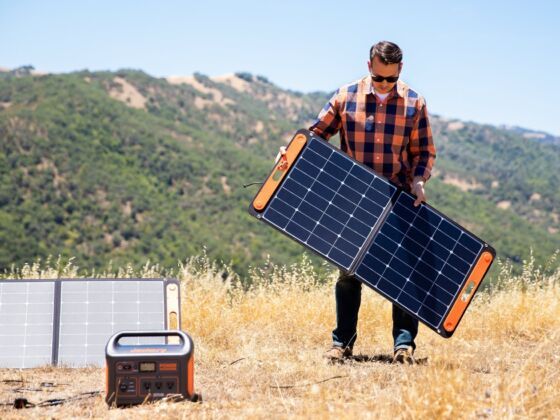This is The Climate Win, the most positive sustainability news around the world every week.
With the weather warming up, camping season is around the corner. In this edition of The Climate Win we look at a breakthrough in solar generator technology that lets you power an entire van or RV campsite, including electric cook stoves and portable devices. That’s 1,500 watts of solar power harvested by portable solar panels in just 2.5 hours. We also cover a few easy ways you can make your camping trips more eco-friendly, whether they’re quick weekend car camps or full-summer #vanlife expeditions.
When camping, road tripping, or #vanlifing, powering devices like laptops, cell phones, and kitchen appliances can be a challenge. Traditional generators work fine, but they run on gasoline or propane. Enter Jackery, a California company that launched the first lithium battery charging station in 2015 and has followed this year with the most reliable, non-gas portable generator on the market, powered by its own portable solar panels.
Of course, there are multiple solar generators available, as well as portable solar panels useable for camping and van travel. What separates Jackery’s Explorer Portable Power Station is its development of an upgraded MPPT solar regulator, known as Solarpeak Technology, a built-in algorithm and battery charger that increases the generator’s charging efficiency by up to 30 percent. With the generator and the portable panels combined, the Explorer becomes a full-circle portable solar-powered station that can be charged to 80 percent in about 2.5 hours.
The Explorer Power Station, available in wattages ranging from 160 to 2,000, looks and feels much like a traditional gas-powered generator. For a bit of reference, 1,500 watts is enough to power an entire campsite including electric cooking equipment; devices like a laptop, phones, and tablets; and other small electronics. It also saves you the need to lug around a tank of gas to do so. The 1,500-watt, middle-of-the-road option runs for $1,599. Lesser-wattage options are more affordable and can still accomplish the same, albeit with more regular charging required. With the solar generator, you have the power — literally — to run an entire campsite or #vanlife setup for an evening on renewable energy, save for the van itself.
Certainly, $1,599 is a sizable investment for a generator (a similar wattage gas generator runs about $600), and most campers don’t need a generator for a night or two of car camping. Jackery also sells its portable, collapsible solar panels a la carte. So even without buying the generator, you can charge your laptop, phone, and other small devices while the sun is shining for far cheaper — its 60-watt panel runs for just $179.
Keeping the rest of your camping trip as eco-friendly as possible
Many options for eco-friendly van travel and camping necessities are super easy and don’t require much, if any, upfront spend. An easy go-to is to get some mason jars of varying sizes and lids to match. In addition to being handy drink glasses, mason jars can be your storage solution for most small items. For example, homemade cleaner — made from water, white vinegar, and an essential oil like lavender or lemon — goes perfectly into a 16 or 24 ounce mason jar. It’s non-toxic, zero-waste (assuming you recycle the containers the ingredients come in) and easy to store. You can keep everything from olive oil to toiletries to coffee grounds in mason jars. If you’re on the road, this handy zero-waste stores map from The Sustainable Collective tells you where you can stock up.
In general, making your camping and #vanlife trip as green as possible follows the same principles as other outdoor excursions. Avoid single-use plastics by bringing a water bottle and water filter with you, along with reusable grocery bags and mesh netting for food items. Use reusable ice blocks in your cooler rather than buying bags of ice wrapped in plastic. Follow the Leave No Trace principles including leaving what you find, minimizing campfire impacts, and properly disposing of waste. And when camping or parking a van outside cities or towns, camp only in areas where overnight stays are allowed — designated campsites, dispersed campsites, and permit-free public lands — so as to minimize impact on wildlife and sensitive habitats. To help locate campsites, here’s our guide to everywhere you can camp permit-free on US public lands.
More climate wins
The US Senate voted this week to reinstate Obama-era restrictions of methane leaks from oil and gas wells, The New York Times reported. The Trump administration had voided the rule, which originally came into effect in 2016.
Washington state became the second state after California to pass a cap-and-trade carbon pricing bill, Grist reported this week. After its expected signature from Governor Jay Inslee, the bill would enact a total allowed carbon cap beginning in 2023 that would slowly lower over time. Businesses will have to buy and trade pollution allowances, with revenue going to renewable energy projects.
A high court in Germany ruled that the country, which is Europe’s largest economy, must expand its plan to reach net-zero carbon emissions by 2050, The New York Times reported. The ruling came after work by young climate activists in Germany who claimed the government was putting the wellbeing of future generations at risk by not taking stronger climate action.
We hope you love the gear and products we recommend! Just so you know, Matador may collect a small commission from the links on this page if you decide to make a purchase.
